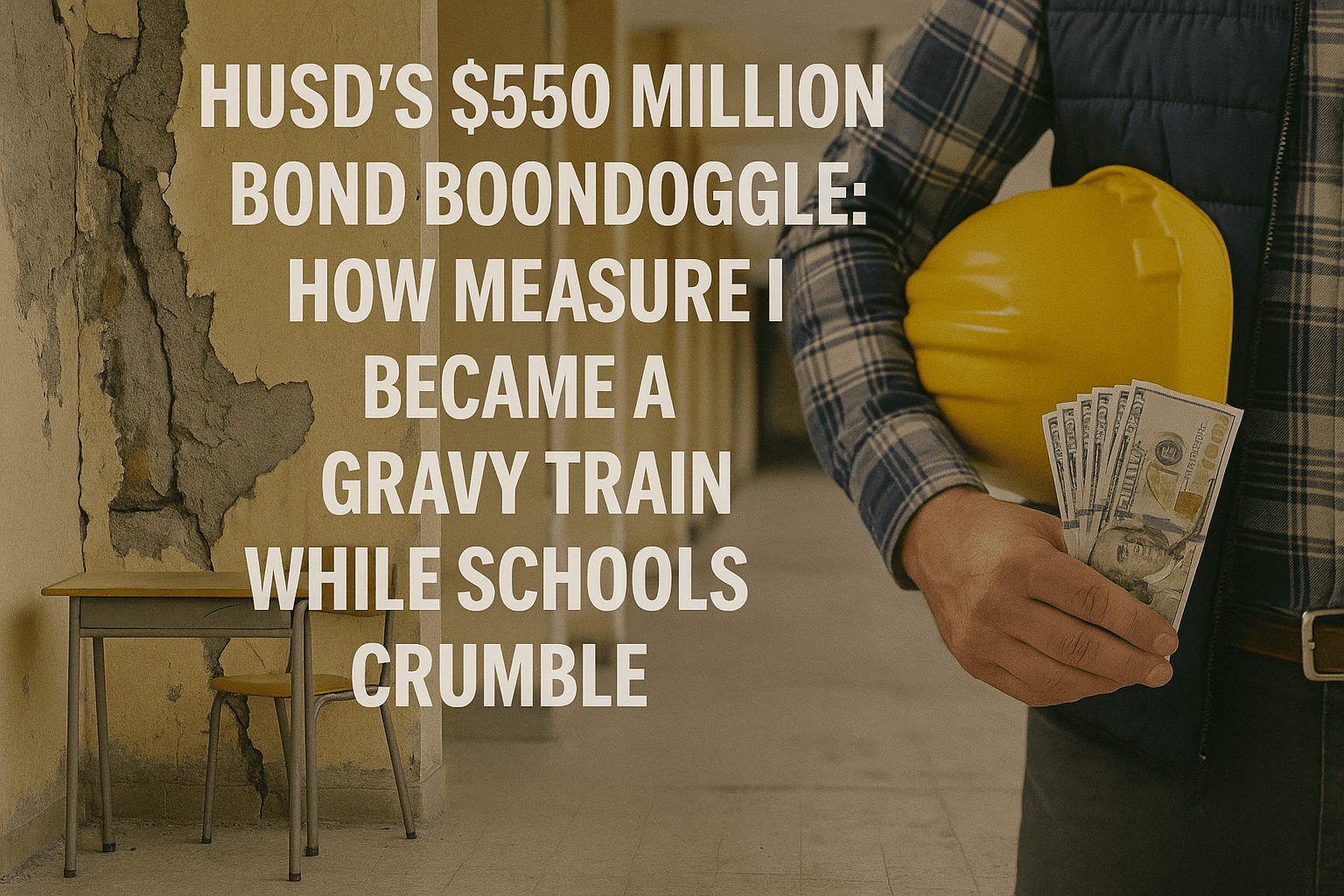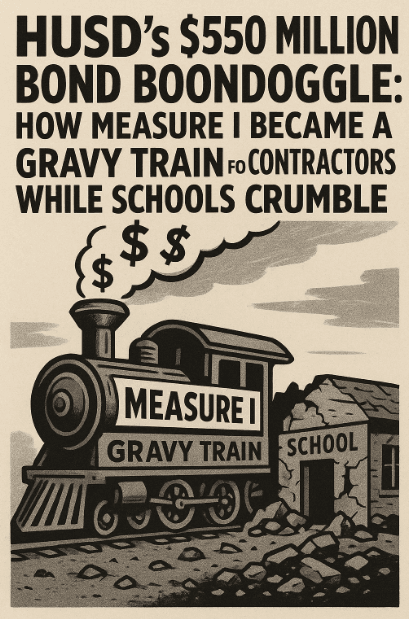HUSD’s $550 Million Bond Boondoggle: How Measure I Became a Gravy Train for Contractors While Schools Crumble


District burns through taxpayer money on consultant fees and change orders while basic maintenance needs go unaddressed
Hayward voters thought they were investing in their children’s future when they approved Measure I’s $550 million bond measure in March 2024. Instead, they’ve created a feeding frenzy for contractors, consultants, and district administrators who treat taxpayer dollars like monopoly money.
While HUSD claims these bonds will upgrade “aging local classrooms, labs, career training facilities,” the reality emerging from board meetings tells a different story: a district so incompetent at basic project management that it can’t even get bids for simple maintenance work, forcing expensive no-bid contracts that would make any private sector CFO cringe.
The Bond Shell Game Begins
HUSD wasted no time tapping into Measure I funds, issuing the first $60 million in April 2025 — barely a year after voter approval. But rather than rushing to address the “urgent” needs they claimed during the campaign, administrators immediately began the familiar dance of consultant contracts and administrative overhead.
The district hired Placeworks for $18,034 just for “CEQA Consultant services” on a single property. That’s nearly $20,000 for environmental paperwork — money that could have purchased classroom supplies for dozens of schools. But why worry about efficiency when taxpayers are footing the bill?
The No-Bid Contract Scandal
Perhaps most revealing is HUSD’s admission that it can’t even manage basic procurement. The district’s CalSHAPE Ventilation Program project at five schools required going to no-bid contracts after the formal bidding process yielded zero responses.
Think about that: HUSD’s reputation for mismanagement is so well-known in the construction industry that contractors won’t even bid on their projects. The district was forced to negotiate directly with Mesa Energy Systems for $721,560 — nearly three-quarters of a million dollars for work that should have been competitively bid.
This isn’t just poor procurement practice; it’s a red flag that HUSD has created such a toxic environment for contractors that the competitive marketplace has abandoned them entirely.
The Contractor Gravy Train
While claiming urgent facility needs, HUSD continues feeding a steady stream of taxpayer money to the same contractors year after year:
Annual Contractor Commitments:
- RQI, Inc.: $74,000 for door and frame maintenance
- CAPS Electric: $74,000 for electrical services
- Pump Pros: $60,000 for pump maintenance
- Vision & Viewpoint Glass: $150,000 annually (with options for five years totaling $750,000)
These aren’t emergency repairs — they’re routine maintenance contracts that any competent facilities department should handle internally. Instead, HUSD has outsourced basic building maintenance while claiming they need $550 million in bonds for infrastructure improvements.
The Change Order Money Pit
HUSD’s project management incompetence becomes clear when examining change orders that inflate costs after contracts are signed. Recent examples include:
Andy’s Roofing Company (Anthony Ochoa Middle School):
- Original contract: $1,678,000
- Final cost after change orders: $1,680,973.14
- Additional cost: $2,973.14
Buhler Commercial Construction (Early Education Expansion):
- Original contract: $2,425,000
- Final cost after change orders: $2,427,233.00
- Additional cost: $2,233.00
While these particular overruns seem modest, they represent a pattern of poor planning and scope management that typically escalates on larger projects. When HUSD can’t accurately estimate costs for routine work, what happens with complex new construction?
The Consultant Industrial Complex
Rather than developing internal expertise, HUSD feeds an ever-growing consultant ecosystem that profits from district incompetence:
Recent Facilities Consulting Contracts:
- Placeworks: $18,034 for environmental consulting on one property
- United Inspections: $6,000 for DSA inspector services on a cell tower modification
- Multiple pre-qualified moving services for “various bond program facilities”
Each consultant contract represents HUSD’s admission that internal staff lack basic competencies. While other districts successfully manage facilities with existing personnel, HUSD requires an army of outside experts for routine tasks.
The Maintenance Assessment Double-Dip
While burning through bond money on consultants and contractors, HUSD continues extracting additional funds through the Maintenance Assessment District (MAD). Property owners pay an annual $28.00 assessment generating $1,368,696 specifically for “maintaining and improving school grounds.”
This raises obvious questions: if taxpayers approved $550 million in bonds for facility improvements AND pay annual assessments for maintenance, why does HUSD still need massive contractor agreements for basic upkeep?
The answer reveals HUSD’s fundamental dysfunction: multiple revenue streams flowing into a system so poorly managed that money disappears without visible improvement.
The Bond Refinancing Distraction
HUSD proudly announced $4.7 million in “taxpayer savings” from refinancing previous bonds alongside the Measure I issuance. Administrators present this as fiscal responsibility while simultaneously demonstrating complete incompetence in project management and procurement.
Refinancing savings mean nothing when the district wastes millions on consultant fees, change orders, and no-bid contracts. It’s like bragging about switching to a lower-interest credit card while maxing out the spending limit.

The Pre-Qualified Contractor Scam
HUSD recently approved a “pool of Pre-Qualified Moving and Associated Services Consultants” for bond program facilities. This sounds efficient until you realize it’s another mechanism to avoid competitive bidding and accountability.
Pre-qualified lists allow administrators to cherry-pick contractors without public scrutiny, creating opportunities for favoritism and inflated costs. The six approved companies — JLZ Moving, Managed Facility Solutions, LEA Relocation Services, Anchor Relocation, Corovan, and Chipman Relocation — now have inside track access to taxpayer-funded work.
The Deferred Maintenance Disaster
While pursuing shiny new bond projects, HUSD continues deferring basic maintenance that creates larger problems down the road. The district’s routine restricted maintenance fund paid $22,610 to Diablo Boiler & Steam for emergency repairs that could have been prevented with proper upkeep.
This penny-wise, pound-foolish approach typifies HUSD’s facilities management: ignore routine maintenance until systems fail, then pay premium prices for emergency repairs while claiming insufficient resources for preventive care.
The Administrative Overhead Explosion
Bond measures are supposed to fund construction and equipment, not administrative salaries. Yet HUSD’s facilities department continues expanding while basic maintenance gets outsourced to contractors.
The district employs directors, managers, and coordinators for facilities operations while paying outside companies to perform work that internal staff should handle. This creates the worst of both worlds: high administrative overhead plus expensive contractor fees.
The Accountability Black Hole
HUSD’s board treats massive facilities expenditures as routine consent items requiring minimal discussion. Members rubber-stamp million-dollar contracts without demanding explanations for cost overruns, procurement failures, or contractor dependency.
The June 2025 meeting approved over $200,000 in facilities contracts as consent items — meaning no individual discussion or scrutiny. This cavalier attitude toward taxpayer money would be shocking in the private sector but passes for normal governance at HUSD.
The Real Infrastructure Crisis
While HUSD burns bond money on consultants and contractors, the actual infrastructure needs remain largely unaddressed. The district’s own bond language promised upgrades to:
- Aging classrooms and labs
- Career training facilities
- Learning technology systems
- Art and music classrooms
- Athletic fields
- Earthquake and fire safety systems
- Emergency communications
- School security improvements
- Accessibility for disabled students
- Plumbing, electrical, and HVAC systems
Yet board meeting after board meeting reveals spending on consultant fees, administrative overhead, and contractor markups rather than direct improvements to these systems.
The Comparative Failure
Other California school districts successfully manage facilities without the consultant dependency and procurement failures plaguing HUSD. Districts with similar enrollment and demographics complete projects on time and under budget while maintaining competitive bidding processes.
The difference isn’t resources or regulations — it’s management competence and accountability. HUSD has created a culture where failure is rewarded with more resources and contractors profit from district dysfunction.
What Taxpayers Should Demand
Before HUSD wastes more Measure I money, taxpayers should demand:
- Independent audit of all bond expenditures to date
- Competitive bidding requirements for all contracts over $25,000
- Elimination of consultant dependency for routine facilities management
- Public reporting of all change orders and cost overruns
- Performance metrics for facilities staff and contractors
- Quarterly public meetings dedicated solely to bond project updates
The Bottom Line
HUSD’s facilities and infrastructure crisis isn’t about insufficient funding — it’s about systematic mismanagement that turns every project into a profit opportunity for contractors and consultants while delivering minimal value to students and taxpayers.
The $550 million Measure I bond should have been a transformational investment in educational infrastructure. Instead, it’s becoming another feeding trough for the consultant industrial complex that profits from public sector incompetence.
When a district can’t even get bids for routine maintenance work, it has no business managing half-billion-dollar construction programs. When administrators outsource basic facilities management while hiring more consultants, they’ve lost all credibility as stewards of public resources.
Taxpayers approved these bonds believing HUSD would efficiently upgrade aging facilities. Instead, they’ve funded an elaborate shell game where money flows to contractors and consultants while schools continue deteriorating under layers of administrative dysfunction.
The real infrastructure crisis at HUSD isn’t aging buildings — it’s failed leadership that treats taxpayer money as an endless resource for consultant contracts and administrative overhead. Until that changes, no amount of bond money will fix what’s fundamentally broken in the district’s approach to facilities management.
Students deserve modern, well-maintained schools. Taxpayers deserve efficient use of their investment. HUSD’s current approach delivers neither while enriching the contractor ecosystem that feeds off public sector failure.
Sources: HUSD 06_11_25 Board of Education Meeting.pdf, HUSD 06_25_25 Board of Education Meeting.pdf













